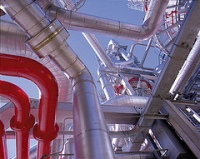Japanese utilities fossilise
22 November 2012
Amid uncertainty about long-term energy policy, Japanese imports of fossil fuels continue to rise as utilities secure supplies of coal and liquefied natural gas (LNG).
 |
| LNG operations (Image: BP) |
Kansai Electric Power Co has announced huge purchase agreements for both LNG and coal as it copes with uncertainty over when nuclear power plants will be allowed to restart, whether a goal to phase out nuclear power will actually be pursued, and what party will be governing Japan next month.
Through an agreement with BP Singapore, Kansai will secure 500,000 tonnes of LNG per year for 15 years from 2017, with prices based on the price index of natural gas rather than crude oil. In the shorter term, the utility has also announced a one-year agreement in conjunction with Kyushu Electric Power to buy 1 million tonnes of coal from US-based Oxbow Carbon. Both Kansai and Kysushu have nuclear power units which are currently idled as the country's new nuclear regulator works to put in place a new legal safety framework prior to permitting reactors to restart.
For Kansai the shutdown means some 7030 MWe of nuclear capacity is idle; for Kyushu the figure is 5000 MWe.
Up until March 2011, Japan's energy policy had relied heavily on nuclear for baseload power, with fossil fuel generation providing added flexibility to meet peak load demands. Only two nuclear units - Kansai's Ohi 3 and 4 - have to date been permitted to restart following the completion of a process of stress tests and approvals.
With most of its nuclear power plants currently out of service, Japan has been increasingly forced to rely heavily on imported fossil fuels for power generation, with the country now the world's biggest consumer of LNG. According to figures from the Japanese Ministry of Finance, Japanese imports of LNG continue to rise, with October imports of the fuel of 6.7 million tonnes up 8.3% on the same period for 2011. The same period saw imports of coal of 15.8 million tonnes, up 5% on 2011 figures.
Researched and written
by World Nuclear News